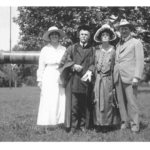La’Shardae Scott, a student in the UK College of Social Work’s Doctorate of Social Work (DSW) program, changed careers following a life-altering diagnosis of sickle cell disease (SCD) in her children.
“I was studying to be a secondary education teacher when I found out that my children have sickle cell disease. I left my role to care for them and then changed my whole career course,” Scott said.
The child of a social worker, Scott said it hadn’t been her intention to pursue the field for a career until she was confronted with navigating the healthcare system for her children and became aware of the issues facing those who live with sickle cell disease. Seeing the size of the problem, and the need for radical change in the management of care for sickle cell patients, she decided to make it her mission to fix it.
“I know what that felt like, hearing that your child has a diagnosis that could potentially kill them, and they are not going to have the most normal life,” Scott said. “That will make any parent jump into gear to make sure that they’re providing the best care. I knew that I had to go into social work because there’s not a lot of resources for sickle cell patients and I want to change that.”
Understanding the Barriers and Building a Strategy
Sickle cell disease (SCD) is a blood disorder that impacts the hemoglobin in a person’s body. Symptoms of SCD include painful episodes or crises, due to the sickle-shaped red blood cells which disrupt blood flow through vessels. Pain can be short in duration or last for days; episodes are unpredictable and may be rare or occur frequently and depending on severity require hospitalization, according to the Mayo Clinic. Complications from this disease include stroke, blindness, and organ damage due to impeded blood flow.
SCD affects millions of people throughout the world, but disproportionally impacts people of Sub-Saharan African descent. It occurs in one out of every 365 Black or African-American births, and one in 13 are born with a sickle cell trait.
“When we speak about statistics and numbers across the board, we know that there is a lot of systematic racism when it comes to the SCD population,” Scott said. “Something we need to take into consideration when caring for individuals who are afflicted with sickle cell is the stigma associated with it and the need for pain management.”
Scott is particularly focused on the transition patients make from childhood to adulthood and taking control of managing their disease. She is heavily invested in education for patients and their families, as well as advocating throughout the broader healthcare system. Scott believes social work and advocacy are essential to effectively helping SCD patients thrive, which is why she decided to further her education at the University of Kentucky College of Social Work.
Taking Advocacy to the Next Level
Scott was researching how to expand her own practice when she began to consider pursuing a DSW degree, which she felt was an ideal way to level up her expertise and integrate her learnings into field work. After attending an online information session, she decided to go for it.
“Within my scope of practice, it was a no-brainer–I just knew it was the right decision,” Scott said of applying to the UK College of Social Work program.
Scott found opportunities to connect with classmates and faculty online through one-on-one meetings and organized groups, which she said have been essential for helping her push through challenges. A group for Black Doctors of Social Work helped Scott connect with other individuals who have similar lived experiences. “I wanted that inclusivity, a safe place where we connect and we share our experiences,” Scott said, adding that the conversations have been helpful for navigating a few hurdles, as she is the first person in her family to pursue a doctorate.
Scott also credits the UK College of Social Work’s DSW student committee with helping her stay connected to her classmates and her program. The committee ensures students are connected and able to get the support they need. As the social justice advocacy chair, Scott organizes virtual meetings once a month for the group to connect on activities, discuss films or books, and swap stories and ideas. The committee is also planning an in-person volunteer event for later this year.
“I’m not in Kentucky, but I feel so in touch with the campus and the faculty. I have two full groups where I feel connected on both ends, one with peers that look like me and then one with all of my peers who are in the same program with me regardless of race,” Scott said.
Building A Place for Patients to Be Heard and Feel Whole
Scott is already applying skills learned in the classroom to the field. “I don’t even have the DSW yet, and I’m already able to see how it can be integrated with my work. The DSW program inspired me to open up my own center.”
The Scott Center for Observation, Treatment and Transition will be focused on bridging the gap from pediatric to adult care and transitioning in sickle cell patients. It will act as a liaison between the hospitals and primary care doctors and offer patients and families a safe place to receive the ongoing, inclusive help that they need through resources and education.
“I think as a social worker we have ethical practices and principles that we want to uphold and make sure that we are demonstrating empathy and dignity with our service–helping these clients be empowered,” Scott said.





